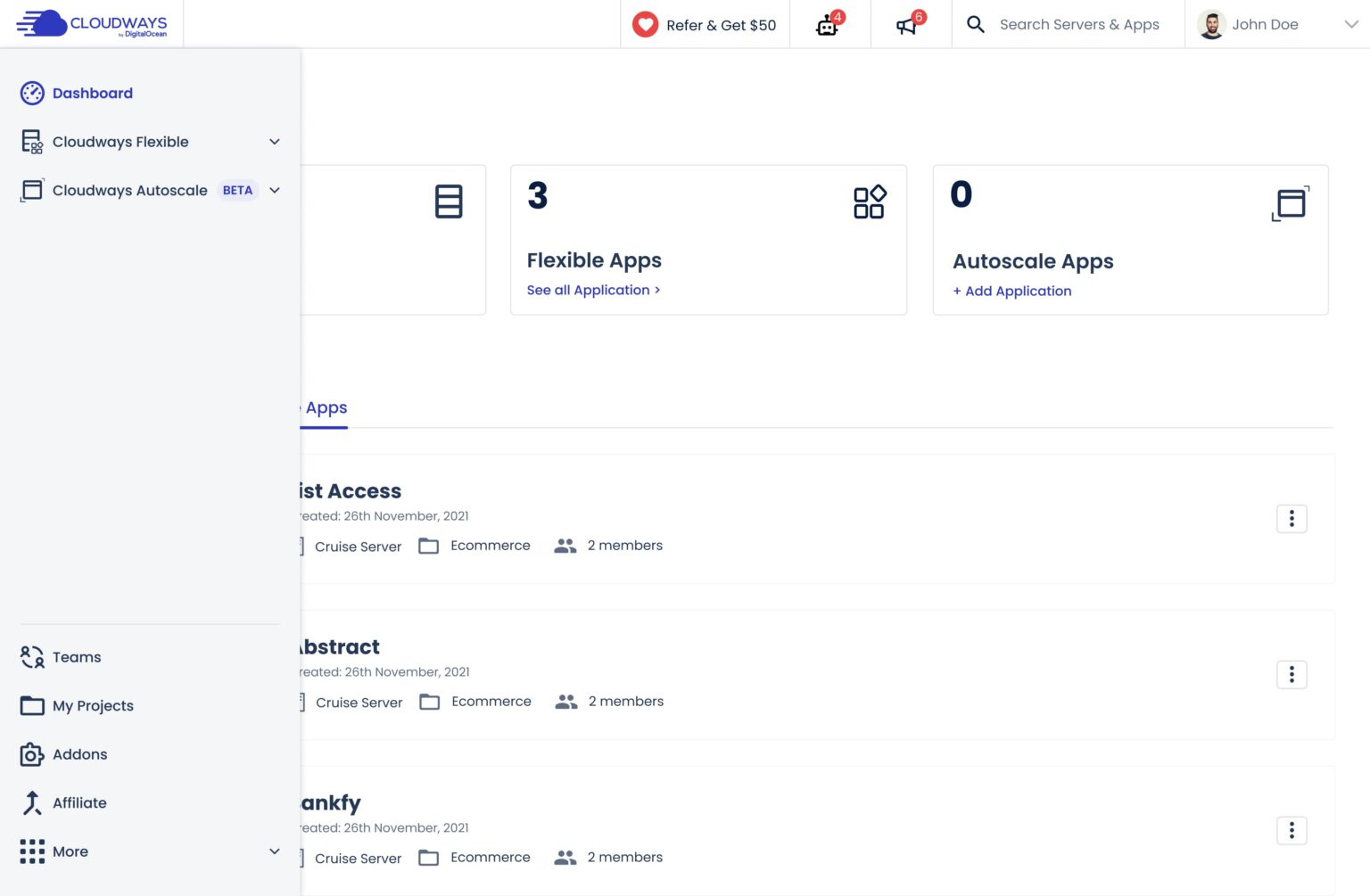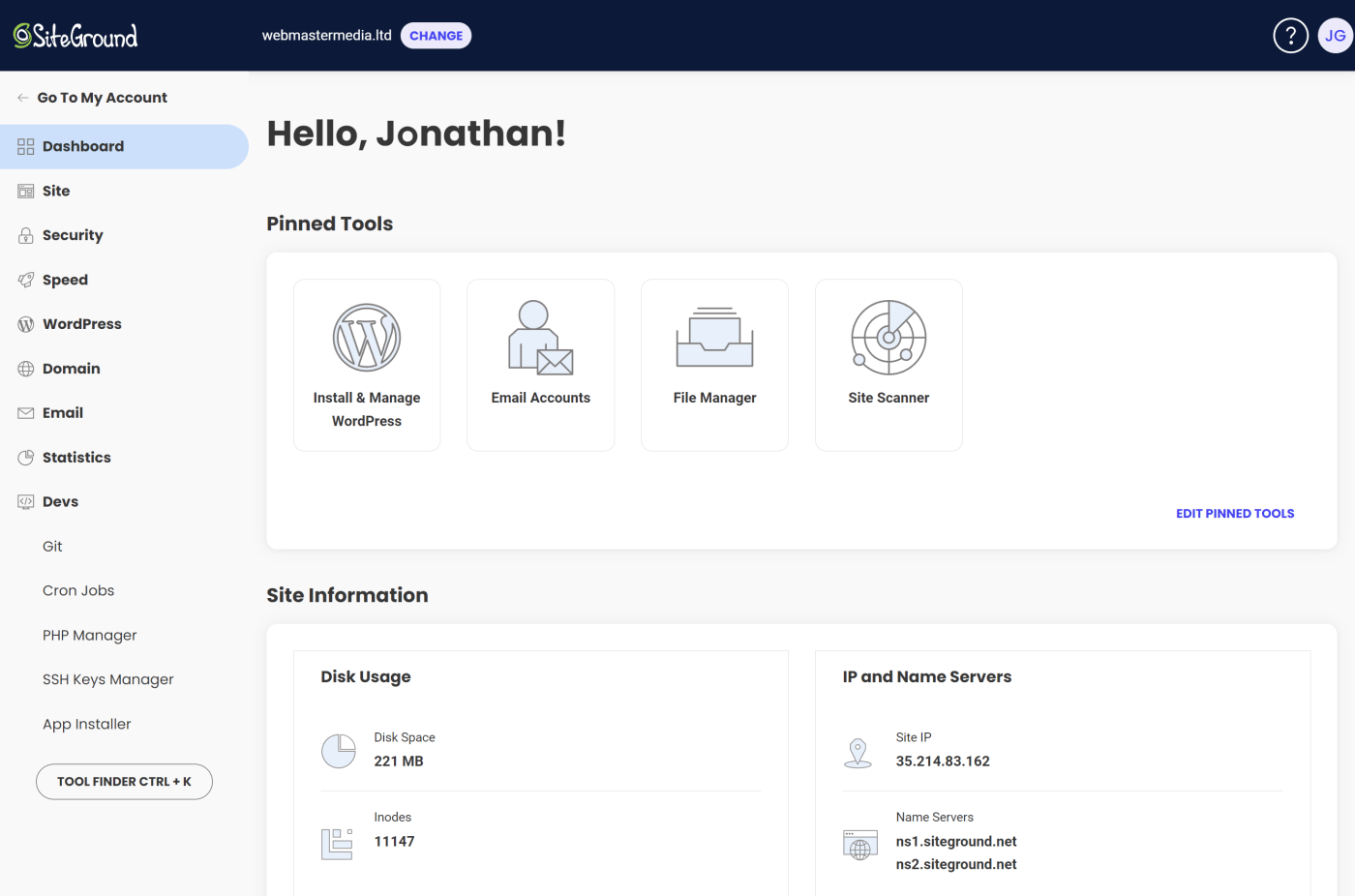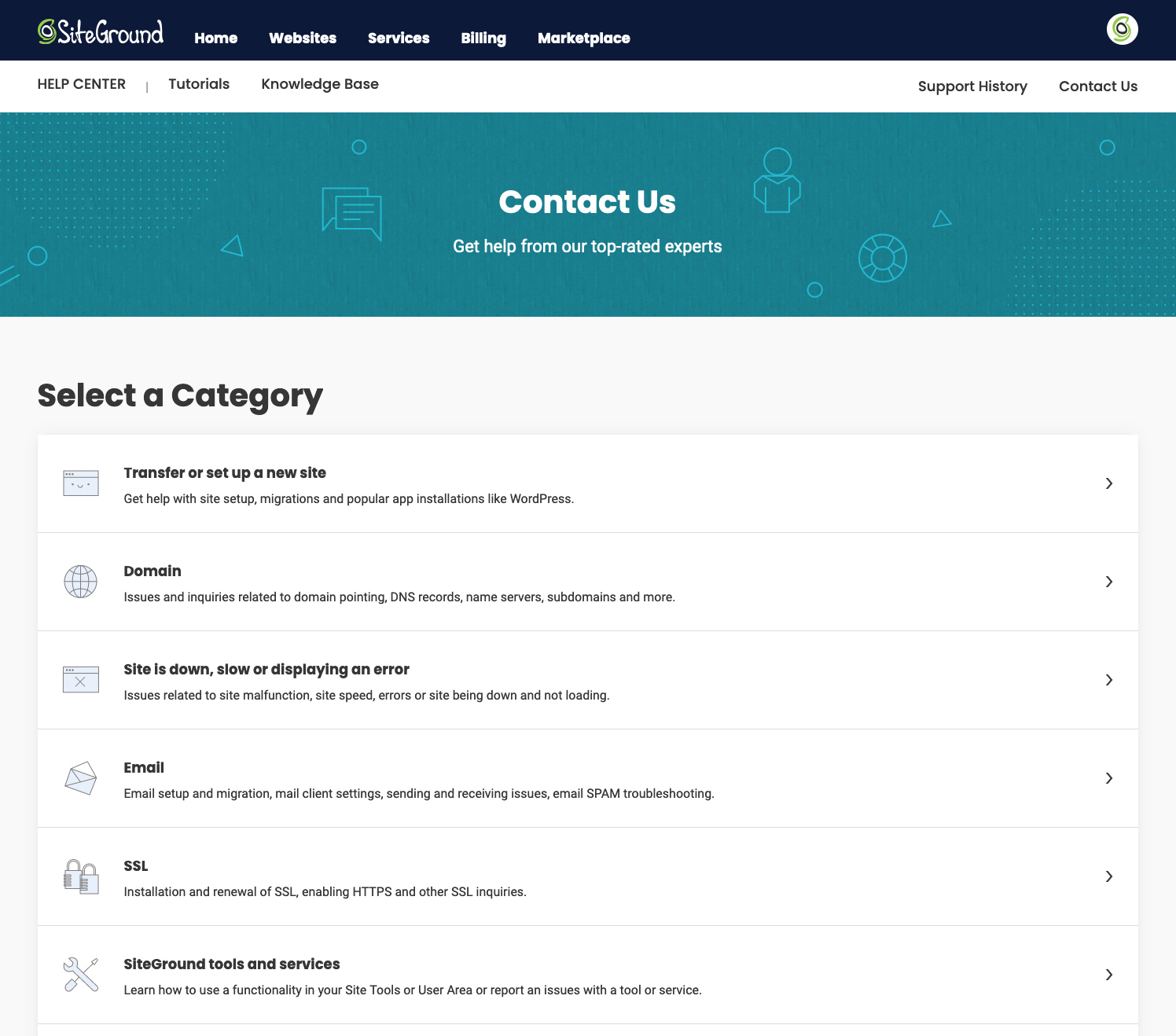Siteground vs Cloudways: Final verdict
Looking over SiteGround vs. Cloudways, both offer unique strengths and target different user needs effectively.
-
Cloudways (Overall grade: 8.5)
excels at providing performance-focused managed cloud hosting, making it a solid choice for high-traffic and media-rich websites. Its strengths include 100% uptime records, scalable cloud infrastructure, built-in caching, and optimized performance features. Cloudways’ intuitive control panel enhances the user experience, catering to both technical and non-technical users with ease. However, the lack of built-in email hosting and a bundled website builder might be less convenient for some users, requiring additional steps to get started. With its pay-as-you-go pricing model, Cloudways offers flexibility, though its premium pricing might not suit everyone’s budget.
SiteGround (Overall grade: 8.8)
stands out with its strong uptime performance, extensive security measures, and user-friendly features, making it ideal for small to medium-sized businesses and personal blogs. Highlights include a 99.99% uptime history, exceptional customer support, and comprehensive tools for WordPress users. SiteGround provides a free site builder, integrated email hosting, and numerous value-added services like free CDN and SSL certificates. While its renewal pricing can be steep, and scaling options might be limited compared to Cloudways, SiteGround’s overall dependability and extensive support resources make it a top choice for user-friendly and secure web hosting.
 Overall grade:8.8 |
 Overall grade:8.5 |
|
|---|---|---|
| Uptime and Availability | 9.4 | 9.5 |
| Hosting Performance | 8.8 | 8.8 |
| Hosting Security | 8.6 | 8.0 |
| Price | 8.4 | 8.6 |
| Hosting Features | 8.5 | 6.9 |
| Ease Of Setup | 8.9 | 9.0 |
| User Management | 8.4 | 8.2 |
| Customer Support | 9.2 | 9.2 |
| User feedback | 4.3/5 | 4.7/5 |
Hosting types offered
Both platforms provide a variety of hosting types, each designed to meet the different needs of users.
 |
 |
|
|---|---|---|
| Shared hosting | ||
| Cloud hosting | ||
| WordPress hosting | ||
| Ecommerce hosting | ||
| VPS hosting | ||
| Dedicated hosting |
Although both offer a variety of hosting plans tailored to different needs, in certain cases, one platform may prove to be more suitable.
Detailed comparison
Uptime and availability
Evaluates the average uptime statistics, uptime guarantee and overall availability of the hosting
provider
Score Components:
- Uptime percentage (30%): evaluates the uptime statistics in given period of time
- Uptime guarantee (20%): Assesses if the platform offers an uptime guarantee and
whether the actual uptime matches the promised guarantee. - General performance (25%): Evaluates how fast is the average response time and overall
it’s stability. - Responsiveness (10%): Adaptability to different devices and screen sizes.
- Availability (25%): Reflects the total downtime and number of outages.
 9.4
9.4
 9.5
9.5
Winner Cloudways: A highly reliable and performance-focused managed cloud hosting provider.
🏆 Winner Cloudways: It’s superior uptime and significantly faster response times make Cloudways a better choice for users who require high performance and stability from their hosting provider.

Cloudways shows a slightly superior performance in terms of reliability and speed. Both hosting services have impressive uptimes, with Cloudways slightly edging out SiteGround with a 99.99% uptime over a 3-month period compared to SiteGround’s 99.89%. This difference in uptime is reflected in the number and duration of outages, where Cloudways experienced 3 outages totaling 12 minutes, while SiteGround had 5 outages totaling 2h 12 minutes.

Cloudways’ advantage is more pronounced in terms of server response time. It boasted an average response time of 389ms, which is significantly lower than the shared hosting industry standard and faster than SiteGround’s average response time of 670ms, which can peak up to 1152ms. This suggests that Cloudways is not only more reliable in maintaining uptime but also in delivering faster website loading speeds, making it a preferable option for users prioritizing performance.
Which one has better hosting performance?
Score Components:
- Hosting speed (30%): This includes SSD quality, Load times, PageSpeed score ranges,
additional information on website speed, built-in plugins for performance enhancement, available caching
methods, and CPU/RAM options - CDN (20%): Considers whether CDN is available or not, whether it’s free or paid, and
the quality of the CDN service - Available data centers (30%): Evaluates the number of data centers and their locations
globally. - Scalibility (20%): Looks at whether elastic scaling is available, the process required
to scale (manual upgrade vs. automatic scaling), the presence of dedicated servers, and the costs
associated with scaling.
 8.8
8.8
 8.8
8.8
🏆 Winner SiteGround: Offers exceptional hosting performance using premium Google Cloud infrastructure.
When it comes to general performance, SiteGround and Cloudways both shine but in different areas. SiteGround utilizes premium Google Cloud infrastructure with SSD persistent storage, which enhances reliability and speed. Their custom PHP setup notably cuts the TTFB, combined with an array of caching options, and offers a Free CDN Service with over 170 edge locations. Meanwhile, Cloudways also leverages SSDs but pairs them with multiple built-in caches like Varnish, Nginx, and Redis. Cloudways integrates Cloudflare Enterprise for advanced CDN capabilities and has data centers located globally. Both platforms offer excellent hardware and speed-boosting technologies but SiteGround’s free CDN and extensive caching options give it a slight edge in performance.
Website Speed
SiteGround’s website speed is enhanced by their ultrafast server setup, including custom PHP and MySQL implementations, making pages load 30% faster. Additionally, they offer dynamic and static caching that speeds up sites up to 5x. They integrate the latest technologies like Brotli, HTTP/2, and TLS 1.3 to keep loading times short. On the other hand, Cloudways ensures speedy load times through SSDs, auto-healing servers, and an optimized stack featuring NGINX and Apache, along with PHP 8.2 for high performance. Cloudways also offers the Breeze plugin for WordPress users, adding another layer of optimization.
Scalability
Both SiteGround and Cloudways offer elastic scaling but in different ways. SiteGround provides automatic scaling options and offers plans such as GrowBig and GoGeek which include features like a one-click staging tool and daily backups. For larger projects, their Cloud plans start at $100/month. Cloudways focuses on vertical scaling where users can manually increase server resources like RAM and CPU based on demand. However, specific costs associated with scaling on Cloudways are not clearly provided. Both platforms are designed to grow with user needs, but Cloudways stands out for its vertical scaling capabilities and flexibility.
Which one has better security features?
and regulatory requirements
Score Components:
- Technical security measures (40%): This includes encryption, firewalls, DDoS
protection, secure configurations, server monitoring, access control and availability of security addons
(e.g Sitelock security). - Operational security measures (30%): Encompasses data privacy, backups and data
redundancy. - Compliance and certifications (20%): Adherence to legal and regulatory requirements
(e.g., GDPR, HIPAA) and possession of certifications (e.g., ISO 27001, SOC 2). - Business and reliability (10%): Factors in the provider’s reputation, uptime
guarantees, and customer support.
 8.6
8.6
 8.0
8.0
Winner SiteGround: SiteGround provides outstanding security features, ensuring enhanced protection for your website.
Technical security measures:
SiteGround boasts a 24/7 system administration, custom web application firewall (WAF), and daily backups with up to 30 copies. Their AI anti-bot system and Google Cloud-managed data centers provide multi-layered security. Cloudways, on the other hand, offers dedicated server-level firewalls, automated protection with Fail2ban, and bot protection powered by MalCare. They ensure application isolation and include advanced caches to maintain site performance and security. While both offer free SSL certificates, SiteGround surpasses with automatic WordPress and WooCommerce updates, emphasizing proactive security.
Operational security measures:
SiteGround’s distributed backups protect data from loss, and their custom security solutions manage overall application security. They also offer phishing-resistant security keys for access protection. Cloudways reinforces security with two-factor authentication, IP whitelisting, and auto-healing servers, which restart automatically to ensure uptime. They also provide periodic security patches and server OS updates. SiteGround’s edge lies in their daily backup policy and ease of backup restores, ensuring business continuity.
Compliance and certifications:
SiteGround does not offer PCI compliance but manages to uphold multi-layered security in its Google Cloud data centers. Cloudways, while not PCI compliant as a managed platform, uses PCI-DSS compliant hardware from its cloud providers and aligns its practices with GDPR requirements. Cloudways also enhances database security through IP whitelisting.
 |
 |
|
|---|---|---|
SSL certificate |
Free Let’s Encrypt |
Free Let’s Encrypt |
Additional security features |
AI anti-bot system |
Bot protection |
PHP versions |
Not specified |
Supports PHP 5.6 to 8.2 |
GDPR compliance |
Not specified |
Likely aligns |
HIPAA compliance |
Not specified |
Not specified |
PCI compliance |
No |
Uses PCI-DSS compliant hardware |
Hosting features
Score Components:
- Domains (20%): Assesses the availability of a free domain, domain purchase options, and
pricing - Email (15%): Considers if the provider offers full email hosting, or is reselling
third-party service, and if the email is only transactional or not - Website builder (15%): Checks if website builder is available, and it’s user
friendliness and overall the level of customization allowed. - Staging environment (20%): Determines if a staging environment is available, allowing
for testing changes before going live. - FTP & SFTP accounts (10%): Evaluates if and how easily users can access FTP and
SFTP accounts - Git and SSH access (20%): Assess whether Git is integrated into the hosting service and
if SSH access is provided
 8.5
8.5
 6.9
6.9
🏆 Winner
SiteGround: A rich feature set with robust security and excellent customer support.
SiteGround and Cloudways offer a variety of features catering to different user needs, but important differences might influence your decision. SiteGround provides a free site builder, which gives users the ability to create websites easily without coding. This is ideal for those who need a quick setup or lack technical skills. SiteGround’s managed WordPress services, automated daily backups, and a wide range of free services such as Free SSL, Free CDN, and email make it a user-friendly option for small to medium-sized businesses or personal blogs. Its use of 100% renewable energy and 24/7 customer support exemplifies its commitment to sustainability and customer service.
Cloudways, meanwhile, emphasizes performance and flexibility. Instead of a built-in website builder, Cloudways focuses on high performance with built-in caches and an optimized stack using NGINX, Apache, and PHP-FPM. This makes it suitable for resource-intensive applications, such as e-commerce websites. The pay-as-you-go model offers scalability, allowing users to upgrade their resources as needed. With vertical scaling, team collaboration features, and Git integration, Cloudways appeals to more technically inclined users or development teams. Despite its advanced capabilities, some might find the absence of a bundled website builder less convenient, requiring additional steps to get started.
 |
 |
|
|---|---|---|
Free domain |
No |
No |
Free SSL |
Yes |
Yes |
Email hosting |
Yes |
Rackspace add-on |
Website builder |
Yes |
No |
Staging environment |
Yes |
Yes |
FTP & SFTP accounts |
Yes |
Yes |
Git and SSH access |
Yes |
Yes |
Free backup |
Yes |
Yes |
Money back guarantee |
Yes |
No |
a location.
As a result in rare cases the features mentioned here can differ from the ones you see on their websites.
Both providers support a range of users from beginners to experts with user-friendly website builders and WordPress staging areas. However, in terms of developer tools, both SiteGround and Cloudways offer robust options including SSH access, support for multiple programming languages, and Git for version control, thus appealing to developers looking for advanced capabilities.
Email services:
SiteGround includes email hosting with all plans, which supports setting up professional email accounts for business purposes. Cloudways, on the other hand, does not offer built-in email hosting but provides an add-on from Rackspace for those who need it. This makes SiteGround a more integrated option for those looking for a complete package, while Cloudways caters to users preferring a more modular approach, potentially incorporating third-party email services.
Price
Score Components:
- Plan value (40%): What each pricing tier offers.
- Transparency and clarity (30%): Clearness of pricing structures.
- Flexibility of plans (20%): Range of options to suit different budgets.
- Hidden costs (10%): Additional expenses not included in the plan.
 8.4
8.4
 8.6
8.6
🏆 Winner
Cloudways: Cloudways offers a wide range of plans with scalable resources suited for various needs.
Evaluating the pricing of plans among various hosting providers can be complex due to their differing pricing and renewal strategies. Additionally, certain plans require annual commitments, which adds to the difficulty of making comparisons. The prices listed are based on monthly commitments; plans requiring annual commitments are indicated. Additionally, although some providers offer identical plans for WordPress and shared hosting, we have created separate tables for each to enhance clarity.
Let’s compare the pricing plans of SiteGround and Cloudways. SiteGround provides affordable shared and WordPress hosting plans starting at $17.99 per month, while Cloudways offers WordPress hosting starting at $11 per month. SiteGround includes numerous freebies such as SSL certificates and email, while Cloudways focuses on cloud-based options with scalable resources. For cloud hosting, SiteGround’s plans begin at $100 per month, while Cloudways offers a starting price of $11 per month for its 1 GB plan. Both providers have strong security measures and reliable support, but Cloudways holds an edge in scalability and flexibility due to its pay-as-you-go pricing model.
 |
 |
|---|---|
|
StartUp $17.99
1 website, 10 GB storage, unmetered traffic, free SSL, daily backup, free CDN, free email, enhanced security, ecommerce enabled, WP-CLI and SSH, managed WordPress, 30-Days money-back. Value for price:7.5
|
DO1GB $11.00
1 Core, 1 GB RAM, 25 GB storage, 1 TB bandwidth, pay-as-you-go hourly pricing, standard support, managed WordPress, free migration. Value for price:8.0
|
|
GrowBig $29.99
Unlimited websites, 20 GB storage, unmetered traffic, free SSL, daily backup, free CDN, free email, enhanced security, ecommerce enabled, WP-CLI and SSH, managed WordPress, 30-Days money-back, on-demand backup copies, 30% faster PHP, staging. Value for price:8.0
|
DO2GB $24.00
1 Core, 2 GB RAM, 50 GB storage, 2 TB bandwidth, pay-as-you-go hourly pricing, standard support, managed WordPress, free migration. Value for price:8.2
|
|
GoGeek $44.99
Unlimited websites, 40 GB storage, unmetered traffic, free SSL, daily backup, free CDN, free email, enhanced security, ecommerce enabled, WP-CLI and SSH, managed WordPress, 30-Days money-back, on-demand backup copies, 30% faster PHP, staging + Git, white-label clients, free private DNS, priority support. Value for price:8.5
|
DO4GB $46.00
2 Core, 4 GB RAM, 80 GB storage, 4 TB bandwidth, pay-as-you-go hourly pricing, standard support, managed WordPress, free migration. Value for price:8.4
|
 |
 |
|---|---|
|
StartUp $17.99
1 website, 10 GB storage, unmetered traffic, free SSL, daily backup, free CDN, free email, enhanced security, ecommerce enabled, managed WordPress, 30-Days money-back, add collaborators. Value for price:7.5
|
N/A
Value for price:N/A
|
|
GrowBig $29.99
Unlimited websites, 20 GB storage, unmetered traffic, free SSL, daily backup, free CDN, free email, enhanced security, ecommerce enabled, managed WordPress, 30-Days money-back, on-demand backup copies, 30% faster PHP, staging. Value for price:8.0
|
N/A
Value for price:N/A
|
|
GoGeek $44.99
Unlimited websites, 40 GB storage, unmetered traffic, free SSL, daily backup, free CDN, free email, enhanced security, ecommerce enabled, managed WordPress, 30-Days money-back, on-demand backup copies, 30% faster PHP, staging + Git, white-label clients, free private DNS, priority support. Value for price:8.5
|
N/A
Value for price:N/A
|
 |
 |
|---|---|
|
Jump Start $100.00
4 CPU cores, 8 GB RAM, 40 GB SSD storage, 5 TB data transfer. Value for price:7.0
|
DO1GB $11.00
1 Core, 1 GB RAM, 25 GB storage, 1 TB bandwidth, pay-as-you-go hourly pricing, standard support. Value for price:8.0
|
|
Business $200.00
8 CPU cores, 12 GB RAM, 80 GB SSD storage, 5 TB data transfer. Value for price:7.5
|
DO2GB $24.00
1 Core, 2 GB RAM, 50 GB storage, 2 TB bandwidth, pay-as-you-go hourly pricing, standard support. Value for price:8.2
|
|
Business Plus $300.00
12 CPU cores, 16 GB RAM, 120 GB SSD storage, 5 TB data transfer. Value for price:8.0
|
DO4GB $46.00
2 Core, 4 GB RAM, 80 GB storage, 4 TB bandwidth, pay-as-you-go hourly pricing, standard support. Value for price:8.4
|
|
Super Power $400.00
16 CPU cores, 20 GB RAM, 160 GB SSD storage, 5 TB data transfer. Value for price:8.5
|
DO8GB $88.00
4 Core, 8 GB RAM, 160 GB storage, 5 TB bandwidth, pay-as-you-go hourly pricing, standard support. Value for price:8.5
|
As a result in rare cases the prices displayed here can differ from the ones you see on their websites.
Enterprise plans
SiteGround’s top-tier cloud hosting plan, Super Power, offers substantial resources such as 16 CPU cores and 20 GB RAM at $400/month, which is suitable for enterprise-level requirements. Cloudways, on the other hand, offers robust resources with its AWS and GCE hosting plans that reach up to 96 cores for AWS 24XL or GCE 24XL, priced at $3569.98 and $3189.82 per month, respectively. These options give enterprises a scalable and flexible environment for large workloads, making Cloudways a compelling choice for expansive needs.
Siteground vs Cloudways: Ease of setup
platform.
Score Components:
- Site migration (25%): Assesses whether the provider offers tools for site migration,
either automated or manual, and whether these services are free or require a fee. - Admin panel usability (35%): Evaluates the type of admin panel provided, such as the
standard cPanel or a custom solution, focusing on its accessibility and user-friendliness for both
technical and non-technical users. - Setup features (20%): Examines the availability and ease of use of various setup
features, including FTP accounts, file managers, email account setup, PHPMyAdmin, and easy CDN
configuration. - Help center quality (20%): Measures the quality and accessibility of the provider’s
help center resources, including articles and tutorials.
 8.9
8.9
 9.0
9.0
🏆 Winner Cloudways: Offers a streamlined setup process with seamless scalability and intuitive controls.
SiteGround uses an Automated Site Setup Wizard, which simplifies the process by allowing users to choose from over 20 applications, including WordPress and Magento. New users can quickly get their sites running with the WordPress Starter Plugin, which assists in adding themes and plugins within minutes. SiteGround’s admin panel is user-friendly, tailored to both beginners and advanced users. It also features a One-click Staging Tool, which is helpful for testing changes before they go live.

Cloudways provides a custom control panel that stands out for its intuitive design, making server and application management straightforward. It offers 1-click actions for common tasks like backup/restore, website cloning, and launching various applications. Cloudways includes pre-installed Git for auto-deployment and SSH/SFTP access, catering to both technical and non-technical users. The platform’s approach to scaling server resources, such as RAM and CPU, is simplified through the control panel, enhancing its ease of use.

For site migrations, SiteGround offers a free WordPress Migrator Plugin, making it easy to transfer WordPress sites without additional costs. In contrast, Cloudways provides free migration for the first website from any host, targeting ease of transfer for new users. Additionally, SiteGround offers professional migration services for $30.00 per site, emphasizing expert handling of migration tasks.
The platforms provide extensive knowledge bases filled with guides, how-to articles, and instructional content. SiteGround offers a wide range of resources alongside 24/7 chat and phone support. Cloudways also has a centralized help center, featuring a knowledge base, ticketing system, and 24/7 live chat support. Additionally, Cloudways benefits from an active community of experts and advanced support add-ons for priority assistance.
User management
accessibility.
Score Components:
- Role customization (40%): Flexibility in creating and defining user roles and
permissions. - Ease of management (30%): User interface and tools for managing users.
- Access control (20%): Effectiveness of access control measures for different user
levels. - Scalability (10%): Ability to manage a growing number of users efficiently.
 8.4
8.4
 8.2
8.2
🏆 Winner
SiteGround: Efficient user management and versatile role creation capabilities.
Both SiteGround and Cloudways offer compelling features for user management. SiteGround allows adding collaborators with their own accounts and a separate login to Site Tools, making it more flexible for team collaboration. Additionally, its ability to manage roles and permissions is quite streamlined through its Client Area, simplifying the process of creating custom roles and assigning them to users. On the other hand, Cloudways leverages WordPress’s built-in user management system, which, while robust, may not offer the same level of flexibility in creating custom roles specifically tailored to unique workflows.
The user interface for managing users on SiteGround is centralized in its Client Area, which is intuitive and easy to navigate. This allows users to manage roles and permissions without complex navigation. In contrast, Cloudways relies on the WordPress Admin Panel for user management, which is integrated but perhaps less streamlined than SiteGround’s dedicated tool. Cloudways does, however, offer a direct link from its platform to the WordPress Admin Panel, providing a seamless, albeit slightly less focused, user management experience.
When it comes to access control, SiteGround’s white-label client feature on GoGeek and Cloud plans stands out. It offers a tailored experience where clients can access site tools without seeing SiteGround branding, enhancing professionalism. SiteGround also excels in maintaining efficient management of growing user bases through its detailed role customization. Cloudways provides various standard WordPress roles, which are effective but might lack the granular control offered by SiteGround’s custom roles and white-label options.
SiteGround user roles table:
| Role | Description | Access highlights |
|---|---|---|
| Collaborator | Team member with individual login to Site Tools. | Can build, maintain the site, and contact support. |
| Custom Role | Custom client role with specific tool access. | Allows selective access to Site Tools as per configuration. |
| White-label Client | Client with white-label access on GoGeek and Cloud plans. | Access Site Tools without SiteGround branding. |
Customer support
hosting provider.
Score Components:
- Support communication channels (30%): Measures the variety of customer support types
provided (live chat, chatbot, email, phone, etc.) - Availability (20%): Assesses the availability hours for each channel, including 24/7
support options. - Technical support quality (30%): Assesses whether the provider offers comprehensive
technical support, including hardware upgrades (e.g., HDD to SSD), software installations, and web
server configuration changes. - Enterprise support (20%): Checks if there are dedicated or priority support services
for enterprise-level customers.
 9.2
9.2
 9.2
9.2
🏆 Winner
SiteGround: Efficient and diverse range of customer support channels with fast response times and high customer satisfaction.
 |
 |
|
|---|---|---|
Phone support |
||
Live chat support |
||
Chatbot |
||
Email/ticket support |
||
Enterprise support (dedicated agent, priority support) |

SiteGround and Cloudways both offer 24/7 customer support, but their services differ in several ways. SiteGround provides chat and phone support for general inquiries, with designated hours for account verification, renewals, and cancellations. Technical assistance is available from 7 a.m. to midnight EST, via phone or a Help Ticket for email support. They have separate contact numbers for US and international customers. However, some users have reported issues such as slow response times and communication difficulties, often attributed to outsourcing.

On the other hand, Cloudways also offers round-the-clock support via live chat, phone, and tickets, with a notable emphasis on providing comprehensive tech support across all plans. On higher-tier plans, Cloudways offers advanced technical support, assisting with significant hosting changes like server configurations and software installations. While Cloudways generally receives positive feedback, some complaints highlight longer wait times for resolving complex issues, a challenge common in the hosting industry.
Siteground vs Cloudways: User feedback
SiteGround garners consistently high praise for its exceptional customer support and user-friendly tools, frequently being described as reliable and straightforward to use. Users commend the fast and knowledgeable technical assistance, which is available through various channels like chat and phone, often highlighting the effectiveness and patience of support representatives. Despite these positive aspects, some users find renewal pricing relatively expensive and note that navigating to the support section can be cumbersome. Issues with specific features, such as webmail interface and certain plugins, are also mentioned, but overall, SiteGround is recommended for its strong support and ease of use, especially for beginners and small businesses.
Cloudways consistently receives high praise for its ease of use, robust performance, and excellent customer support. Many reviewers highlight the platform’s intuitive interface, effective server management features, and the ability to choose from top-tier cloud providers like AWS and DigitalOcean. Users appreciate the scalable hosting options and reliable customer service, which often includes quick response times and helpful assistance. However, some customers note areas for improvement, such as the absence of email hosting, limitations on server vendor choices, and discrepancies in pricing transparency. Overall, Cloudways is deemed a solid hosting provider, especially valued for its managed hosting features and performance enhancement capabilities.
Siteground vs Cloudways: FAQ
Which platform is better suited for hosting WordPress websites?
Both SiteGround and Cloudways offer excellent WordPress hosting services, featuring optimized performance, free migrations, and staging environments. SiteGround is particularly user-friendly with integrated email hosting and a free site builder, making it ideal for small to medium-sized businesses or personal blogs. Cloudways emphasizes high performance with features like built-in caching and vertical scaling, suitable for more technically inclined users or resource-intensive websites. Ultimately, both platforms are well-suited for WordPress hosting, but the choice depends on specific needs such as ease of use versus advanced performance capabilities.
Which platform offers better customer support?
SiteGround is known for its exceptional customer support, offering 24/7 availability through live chat, phone, and tickets, with quick response times and high customer satisfaction. Cloudways also provides robust support with 24/7 email and chat, and phone support upon request, along with premium options like private Slack channels and dedicated account managers. While both platforms offer reliable support, SiteGround’s extensive knowledge base and pinned help give it a slight edge in user assistance and educational resources.
Which hosting service offers more scalability options for growing websites?
Cloudways stands out in scalability with its vertical scaling feature, allowing users to manually increase server resources like RAM and CPU based on demand. This flexibility is particularly beneficial for high-traffic websites and resource-intensive applications. SiteGround also offers elastic scaling options, especially with its GrowBig and GoGeek plans, but its preset plans might not provide the same level of customization and flexibility as Cloudways’ pay-as-you-go model and extensive cloud infrastructure options.
What are the differences in the control panels offered by each hosting service?
SiteGround uses its proprietary Site Tools control panel, which is user-friendly and designed to cater to both beginners and advanced users, featuring tools for one-click staging and automated site setup. Cloudways provides a custom control panel that is intuitive and focuses on server and application management, with 1-click actions for backups, cloning, and scaling. While SiteGround’s control panel is more streamlined for everyday tasks, Cloudways offers more advanced features and greater flexibility for technically inclined users.
How do the providers handle email hosting and what features are included?
SiteGround includes email hosting with all its plans, supporting professional email account setups, making it a more integrated solution for users. Cloudways does not offer built-in email hosting but provides an add-on from Rackspace for those who need it, which means users may have to take additional steps or use third-party email services. This makes SiteGround a more convenient choice for users seeking an all-in-one package, while Cloudways caters to those preferring modular solutions.
The making of this blog
We followed a clear, step-by-step process to write and research this article.








